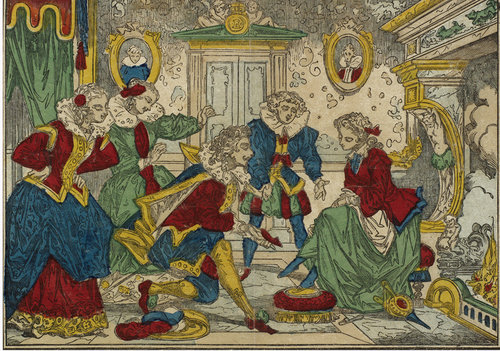Popular Prints from China and Epinal, France
dal 12/6/2007 al 28/7/2007
Segnalato da
University Museum and Art Gallery - UMAG
12/6/2007
Popular Prints from China and Epinal, France
University Museum and Art Gallery - UMAG, Hong Kong
The exhibition features over eighty prints from France dating to the 19th century, and from China, dating from the Qing dynasty (1644-1911) to the Republican period. Viewers can appreciate and recognize the distinctive folk arts from the two nations.

Prints
The Consulate General of France in Hong Kong and Macau and the University
Museum and Art Gallery, The University of Hong Kong are pleased to present
the exhibition "Popular Prints from China and Epinal, France". The
exhibition features over eighty prints from France dating to the 19th
century, and from China, dating from the Qing dynasty (1644–1911) to the
Republican period. Viewers can appreciate and recognize the distinctive folk
arts from the two nations.
The Chinese New Year picture has a long history and originated in door gods.
During the Song dynasty, advances in printing techniques promoted the
development of New Year pictures and the subjects began to change from
religious to daily life. After the fall of the Song dynasty, to reflect a
desire for a stable and prosperous life, New Year pictures with auspicious
subjects were popular. New subjects such as scenes from operas, novels and
popular literature also emerged. During the Qing dynasty, New Year pictures
thrived and many print shops were established throughout China. Among them,
Taohuawu in Suzhou, Yangliuqing in Tianjin, Weixian in Shandong, and Mianzhu
in Sichuan are acknowledged as the "Four Great Centres". The subjects of the
New Year pictures were varied, including traditional subjects such as
historical figures, ancient legends, and auspicious blessings, as well as
scenes from popular literature, operatic stories, and social and political
satire. Pictures from the Republican period are characterised by the new
ideas of the era.
European woodblock printing emerged in the 15th century when the most
popular subjects were portraits of saint which were posted in homes to
protect the family. Later, the increasing availability of paper enabled the
rapid development of printmaking. By the mid-15th century, the invention of
copper engraving and removable-type printing techniques led to a revolution
in printing in the West. At the end of the 18th century, the introduction of
lithography facilitated the further development of printing. This exhibition
features woodblock, copper and lithographic prints produced in Epinal,
France. The subjects of the prints include social satire, fables and
legends, saints and other figures, animals and plants, and historical
events. In the 18th and 19th centuries, Epinal had become a major centre of
printing and the main area for the production of popular prints. Other
cities in France included Metz, Nancy, Lille and Paris.
The exhibition opening will take place at the Museum at 6:00 p.m. on Tuesday
12 June, 2007. Mr Jean-Pierre Thébault, Consul General of France in Hong
Kong and Macau, Mr Paul Kan, Chair, Champion Technology Holdings Limited,
and Professor John Malpas, Acting Vice-Chancellor of HKU will officiate at
the ceremony.
University Museum and Art Gallery - UMAG
94 Bonham Road, Pokfulam (University of Hong Kong) - Hong Kong



